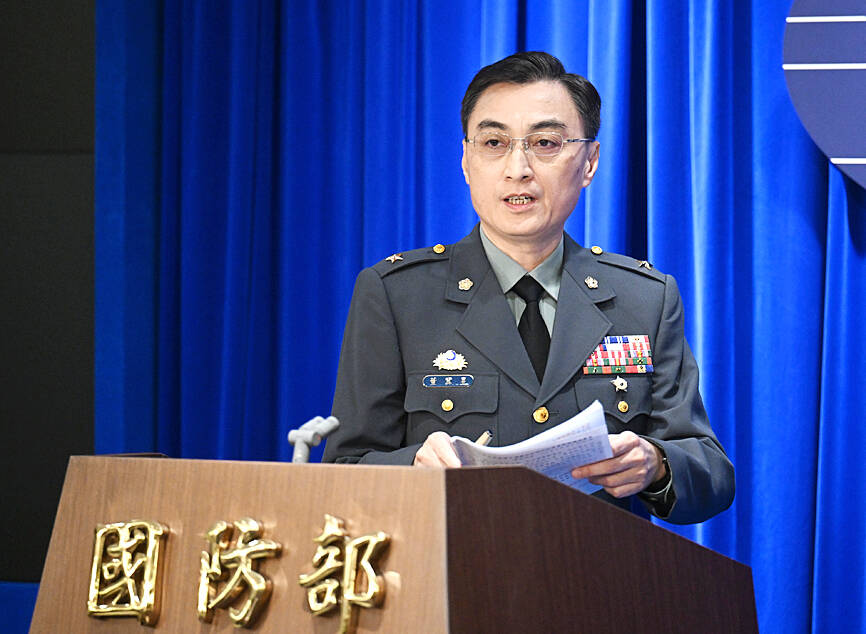Taiwan’s annual war games this year are to practice “kill” zones at sea to break a blockade and simulate a scenario where China suddenly turns one of its regular drills around the nation into an actual attack, the Ministry of National Defense said yesterday.
The nation is to start its main annual Han Kuang exercises this month with tabletop drills, extended from the usual five days to eight given the number of scenarios to be included, followed by actual combat exercises from July 22 to 26, the ministry said.
Tung Chih-hsing (董冀星), head of the ministry’s joint combat planning department, told a news briefing in Taipei that the drills from Friday next week to April 26 would practice how to speedily respond to one of China’s drills suddenly turning into an attack, something military planners have begun to worry about, considering their regularity.

Photo: Lin Cheng-kun, Taipei Times
The computerized war games would be conducted using the US-built Joint Theater Level Simulation platform to verify the military’s response to “gray zone” tactics, blockades and other possible Chinese invasion scenarios, Tung said.
Those simulations would be held around the clock for eight days in a row, he said.
How different branches of the armed forces can mount a coordinated response to a Chinese blockade would be another focus, Tung said.
The drills are to integrate naval, air and coast guard forces, shore-mounted anti-ship weapons and drones to establish a maritime “attack and kill chain,” he added.
“In addition, [we will] use naval and air forces and coast guard ships to jointly carry out escort operations” to ensure sea and air links to the outside world remain open, Tung said.
During one major round of war games around Taiwan in April last year, China practiced precision strikes and blockading the nation.
Since Russia’s invasion of Ukraine two years ago, Taiwan has been looking to see what lessons it can learn and integrate into its own exercises, especially how the much smaller Ukrainian forces have been able to fend off the larger Russian military.
Tung said those would again feature this year, along with those learned from the war in Gaza.
For both of those conflicts, Tung said officials were looking at the use of psychological warfare and asymmetric operations in particular, but did not elaborate on how they would figure into the drills.
President Tsai Ing-wen (蔡英文) has championed the idea of “asymmetric warfare” to make Taiwan’s forces, also much smaller than China’s, more mobile and hard to attack, for example with vehicle-mounted missiles and drones.
Additional reporting by CNA

CAUTION: Based on intelligence from the nation’s security agencies, MOFA has cautioned Taiwanese travelers about heightened safety risks in China-friendly countries The Ministry of Foreign Affairs (MOFA) yesterday urged Taiwanese to be aware of their safety when traveling abroad, especially in countries that are friendly to China. China in June last year issued 22 guidelines that allow its courts to try in absentia and sentence to death so-called “diehard” Taiwanese independence activists, even though Chinese courts have no jurisdiction in Taiwan. Late last month, a senior Chinese official gave closed-door instructions to state security units to implement the guidelines in countries friendly to China, a government memo and a senior Taiwan security official said, based on information gathered by Taiwan’s intelligence agency. The

The National Immigration Agency (NIA) said yesterday that it will revoke the dependent-based residence permit of a Chinese social media influencer who reportedly “openly advocated for [China’s] unification through military force” with Taiwan. The Chinese national, identified by her surname Liu (劉), will have her residence permit revoked in accordance with Article 14 of the “Measures for the permission of family- based residence, long-term residence and settlement of people from the Mainland Area in the Taiwan Area,” the NIA said in a news release. The agency explained it received reports that Liu made “unifying Taiwan through military force” statements on her online

Taiwan Semiconductor Manufacturing Co (TSMC), the world’s largest contract chipmaker, said yesterday that it is looking to hire 8,000 people this year, at a time when the tech giant is expanding production capacity to maintain its lead over competitors. To attract talent, TSMC would launch a large-scale recruitment campaign on campuses across Taiwan, where a newly recruited engineer with a master’s degree could expect to receive an average salary of NT$2.2 million (US$60,912), which is much higher than the 2023 national average of NT$709,000 for those in the same category, according to government statistics. TSMC, which accounted for more than 60 percent

Tung Tzu-hsien (童子賢), a Taiwanese businessman and deputy convener of the nation’s National Climate Change Committee, said yesterday that “electrical power is national power” and nuclear energy is “very important to Taiwan.” Tung made the remarks, suggesting that his views do not align with the country’s current official policy of phasing out nuclear energy, at a forum organized by the Taiwan People’s Party titled “Challenges and Prospects of Taiwan’s AI Industry and Energy Policy.” “Taiwan is currently pursuing industries with high added- value and is developing vigorously, and this all requires electricity,” said the chairman